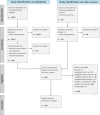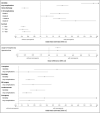Impact of sarcopenia on outcomes in surgical patients: a systematic review and meta-analysis
- PMID: 37696253
- PMCID: PMC10720826
- DOI: 10.1097/JS9.0000000000000688
Impact of sarcopenia on outcomes in surgical patients: a systematic review and meta-analysis
Abstract
Background: Surgeons have historically used age as a preoperative predictor of postoperative outcomes. Sarcopenia, the loss of skeletal muscle mass due to disease or biological age, has been proposed as a more accurate risk predictor. The prognostic value of sarcopenia assessment in surgical patients remains poorly understood. Therefore, the authors aimed to synthesize the available literature and investigate the impact of sarcopenia on perioperative and postoperative outcomes across all surgical specialties.
Methods: The authors systematically assessed the prognostic value of sarcopenia on postoperative outcomes by conducting a systematic review and meta-analysis according to Preferred Reporting Items for Systematic Reviews and Meta-Analyses (PRISMA) guidelines, searching the PubMed/MEDLINE and EMBASE databases from inception to 1st October 2022. Their primary outcomes were complication occurrence, mortality, length of operation and hospital stay, discharge to home, and postdischarge survival rate at 1, 3, and 5 years. Subgroup analysis was performed by stratifying complications according to the Clavien-Dindo classification system. Sensitivity analysis was performed by focusing on studies with an oncological, cardiovascular, emergency, or transplant surgery population and on those of higher quality or prospective study design.
Results: A total of 294 studies comprising 97 643 patients, of which 33 070 had sarcopenia, were included in our analysis. Sarcopenia was associated with significantly poorer postoperative outcomes, including greater mortality, complication occurrence, length of hospital stay, and lower rates of discharge to home (all P <0.00001). A significantly lower survival rate in patients with sarcopenia was noted at 1, 3, and 5 years (all P <0.00001) after surgery. Subgroup analysis confirmed higher rates of complications and mortality in oncological (both P <0.00001), cardiovascular (both P <0.00001), and emergency ( P =0.03 and P =0.04, respectively) patients with sarcopenia. In the transplant surgery cohort, mortality was significantly higher in patients with sarcopenia ( P <0.00001). Among all patients undergoing surgery for inflammatory bowel disease, the frequency of complications was significantly increased among sarcopenic patients ( P =0.007). Sensitivity analysis based on higher quality studies and prospective studies showed that sarcopenia remained a significant predictor of mortality and complication occurrence (all P <0.00001).
Conclusion: Sarcopenia is a significant predictor of poorer outcomes in surgical patients. Preoperative assessment of sarcopenia can help surgeons identify patients at risk, critically balance eligibility, and refine perioperative management. Large-scale studies are required to further validate the importance of sarcopenia as a prognostic indicator of perioperative risk, especially in surgical subspecialties.
Copyright © 2023 The Author(s). Published by Wolters Kluwer Health, Inc.
Conflict of interest statement
None of the authors have a financial interest in any of the products, devices, or drugs mentioned in this manuscript.
Figures



References
-
- Rossini PM, Marra C. Demographic changes and the challenge for a healthy ageing. Stud Health Technol Inform 2014;203:23–31. - PubMed
-
- https://stats.oecd.org/index.aspx?queryid=30167 Organisation for Economic Co-operation and Development Demographic References. Population age structure, 1 May 2022.
-
- Kwok AC, Semel ME, Lipsitz SR, et al. The intensity and variation of surgical care at the end of life: a retrospective cohort study. Lancet 2011;378:1408–1413. - PubMed
-
- Peretz L, Rappoport N. Deviation of physiological from chronological age is associated with health. Stud Health Technol Inform 2022;294:224–228. - PubMed
Publication types
MeSH terms
Grants and funding
LinkOut - more resources
Full Text Sources
Medical

